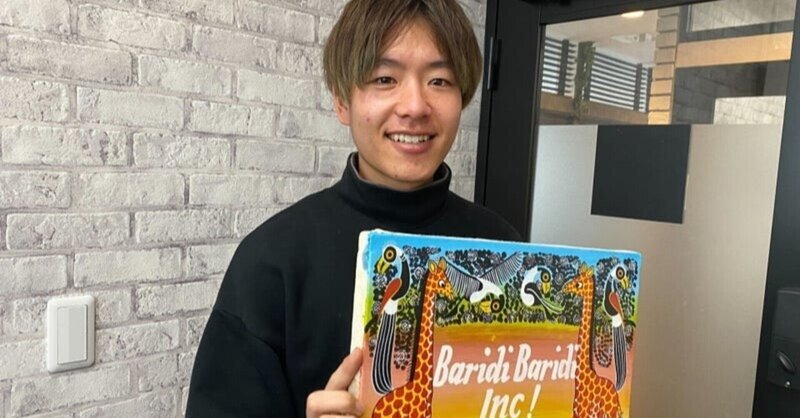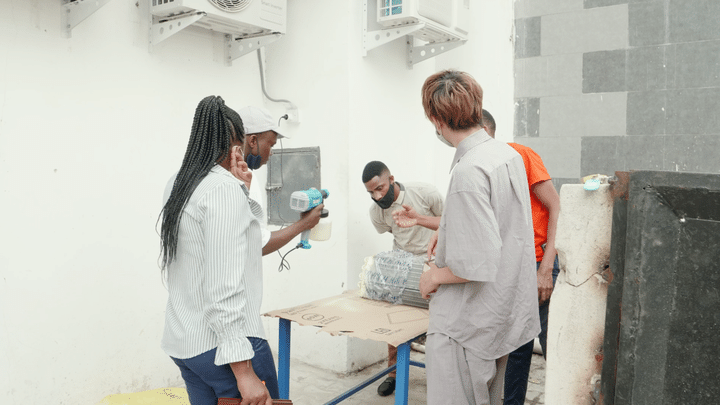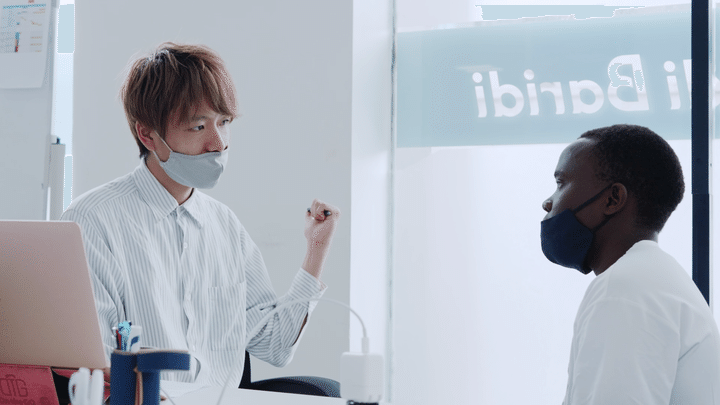
“How Can I Contribute to Baridi ?” -Doing Everything I Can to Contribute for—Shuto Sakai 【Baridi Baridi employee interview, special number 】
This time, we conducted a special graduation interview with Shuto Sakai, who has been working as an intern at Baridi Baridi Japan and Tanzania.
Baridi Baridi members appearing in this interview
Shuto Sakai
Currently a graduate student at Kobe University. Joined Baridi Baridi as an intern in October 2020. Experienced working as an intern at Baridi Baridi Tanzania from August to October 2021. Shuto Sakai's note.
Nagisa Irie (Interviewer/Editor)
Currently a university student at Kwansei Gakuin University. Joined Baridi Baridi as an intern in May 2021. Involved in making company regulations and managing the CEO’s tasks.
It's not about short-term profits, but about what we should be doing in the long term
--Let's get started. Thank you for your time today!
Shuto: Thank you very much.
-- How did you get into Baridi Baridi as an intern?
Shuto: Firstly, the employment rate of the graduates from the faculty of Business Administration in my college I belonged to was over 90%, and my classmates were finding jobs one after another, so I decided to go on to graduate school.
The day after the acceptance announcement for graduate school, I saw a post on Facebook about Baridi Baridi's intern recruitment.
When I saw Hiroki san(CEO of Baridi Baridi Inc.)'s founding blog on the application, I wanted to work with him. I was worried that while my classmates were steadily advancing their careers, I didn't have any job-hunting experience and didn't have any experience working in the business field, so I decided to take the plunge and challenge myself to become an intern.
--So, the blog written by Hiroki san encouraged you to join Baridi?
Shuto: Exactly. In addition to what Baridi wanted to accomplish, the Vision and Shared Values were a great fit for me. I felt like I wanted to hear his story and join as an intern.
-- I see. When you read the blog, what kind of words resonated or impressed you?
Shuto: “We don’t need the ‘As long as it’s okay for now’ anymore” which is the title of blog, had the most impact and was a catch.
I agreed that we should think about what we should do in the long term rather than what we can do in the short term. It's easy to say, but I thought it was great for me to challenge that vision head-on, so I really wanted to work there.
-- When you joined, I think Baridi was still in its early days, but I would like you to tell me the atmosphere at that time and the work you were doing.
Shuto: When I joined the company, Baridi's Japanese office was only a few months old, and there were only two local members in Tanzania. Moreover, the Japanese members stayed in Japan for a long time due to the Corona virus.
So, when I went to the office, there was Hiroki san sitting next to me, Yoshi san and Ayaka san in the room next door, and Mika san sometimes coming to the office. It was like everyone gathered in a small place and worked.
For the time being, there weren’t proper systems as a company, but we had something to do every day, and I felt like we were working hard. I did not have business experience or internship experience, so I was compiling general affairs and materials.
As the company's regulations had not been made yet, I shared them with another intern to make regulations such as Working Regulations.
-- It's a different atmosphere than now. You said that you worked with Hiroki san from the beginning. Is there anything that left an impression on you?
Shuto: Yes. He usually has a very soft manner and he makes jokes, which makes me think he's funny. Even so, as a CEO and a businessperson, I have great respect for him and he gives me a lot of advice, each of which sticks in my mind.
One of them was given to me, when I was still unable to do anything, and Hiroki san said, "Let's increase the number of times we stand at bat."
This leads to one of the Shared Values, “Speed Matters,” where I go to bat more often, get feedback and move on to next job. To do that, I was told that it is important to work quickly with “Speed Matters.”
Also, Hiroki san said “In business, the batting order doesn’t go from 1 to 9 like in baseball, but when people want to entrust a certain job, it only goes from 1 to 4. Therefore, in order to grow into a person who can be trusted by others, you have to be able to do all at bats that you can do now, and in order to do that, you have to finish your work quickly with a sense of speed and become a chosen person”.
I was aware of Speed Matters as a value, but I think I put it into practice immediately.
The chance to work at Tanzania
--You have experience working in Tanzania. How did you feel when Hiroki san suggested that you become an intern there?
Shuto: Well, more than half a year had passed since I entered the company then, and I had been entrusted with the management of the employee magazine and website creation. I felt that I gradually gained confidence, and that I could show my achievements little by little. That’s when Hiroki san gave me the offer.
Baridi does not recruit interns in Tanzania, and I have always said that interns doesn’t have the opportunity to go to Tanzania. So I was so happy to hear such an evaluation that I raised my fists in triumph after hearing the offer.
--Did you decide to go as soon as you heard about business trip to Tanzania?
Shuto: Yes. As soon as I was told, I gave a positive reply. Going to Tanzania was one of my goals, so I thought there was no reason not to go.
--When you joined Baridi, did you have any other goals other than going to Tanzania?
Shuto: When I joined Baridi, I thought it was great that we could challenge ourselves with the team with such vision, so I did not set specific goals. One of my more ambitious goals was to go to Tanzania as an intern.
I thought that working in Tanzania, which is at the forefront of our business, would leave an impact on our business and make contributions. That’s why making contributions as much as possible was my goal at the top of the hierarchy.

Struggling with the role and position in the Tanzanian business
--Have you ever studied in advance after hearing about your going to Tanzania?
Shuto: In the three-month stay, I knew that I was first going to be assigned to the service team that install air conditioners and provide after-sales service (maintenance of ACs), so I did not prepare for it. I had the least knowledge about ACs in the team, so I was studying every day just to get by.
Since I could go to a different country for three months, I wanted to be able to speak some Swahili. So, for three months every day, whenever possible, I took 30 minutes to an hour to study Swahili before coming to work. On Saturdays, I called my tutor to study.
--Did you have any worries or difficulties in Tanzania?
Shuto: Well, the two things I mentioned earlier were not painful or difficult, but at first, I was really worried about what kind of position I should take.
In Tanzania, I went as a new member, but the role I was entrusted with was to lead the local members of the service team under my boss, Mika san. I was worried about how to improve the balance between the attitude of learning and the role of leading a team.
After a couple of days, the local members got used to the report line, and they reported to me. So, it was very easy to communicate frankly.
Our team in Tanzania were dealing with what we were told from Mika san in Japan. When I had some problems, I had to communicate with Mika san by writing, and I felt that I couldn’t grasp the speed at the beginning and didn’t have the speed. I wasn’t worried about that, but there were times when I thought, "Oh no, I'm done today," or "I haven't finished this yet this week."
-- I see. Then, when did you have a sense of accomplishment in your work in Tanzania?
Shuto: In terms of communication, the local service team members graduated from VETA, which is not a university but a vocational training school. So, I was a little worried about communication in English.
I had to communicate with Japan in writing, but the problem was that the report was difficult to understand and it was written in very long sentences, so I did not understand what they were saying.
I thought it would be a problem if I didn’t improve things here, otherwise the team wouldn’t be able to work well when I went back to Japan and Mika san was in Japan. I created a report format to lay the basis for communication.
I prepared 5W1H on Slack to summarize the purpose and what to convey when actually reporting. I don’t think it is running now, but I made it at that time, explained it to everyone, and had them use it, so I think they got a sense of what a report should look like.
When I returned to Japan, I had a 1on1 meeting with Mika san, and he said, “It is obvious that the communication quality and skills of team members have improved recently.” It was good that I was able to achieve one result by my own initiative, and that I was able to lay some foundation in Tanzania.
--I think there were a lot of things you thought about when you were in Tanzania, but did you want to do this in your later work in Japan, or did you think about connecting with your internship work in Japan?
Shuto: That's the case with “BARIDI BARIDI TIMES.” When I thought about expanding the team from now on, I thought that it would be good for the company to keep a record of the current 0 to 1 phase, the state and appearance of the team in the start-up stage, and that it would become like an asset one day.
I also thought that both interviewees and readers would have an opportunity to increase engagement with the team and the company.
In addition, I thought that I could create a employee magazine even after I returned to Japan from Tanzania, so I started the plan “BARIDI BARIDI TIMES”, to interview employees.
Putting Myself in a Good Environment and Trying Hard
--What were you aware of while working in Japan and Tanzania?
Shuto: When I was in Tanzania, I was conscious of the tasks that I could do during my 3-month stay and the schedule of tasks that I was entrusted with, while doing everything that I could do every day.
Even so, there were frequent problems in the field. It was common for me to finish a day and say, "Oh, I was just dealing with the trouble today, and it was over in a flash." That’s what happened every day (laughs.)
On the other hand, in Japan, our direct connection with Tanzania, where we do business, is fading. How will the work I am doing now help deliver air conditioners to Tanzanian customers? or Baridi Baridi as a whole? I think it is important to consider the position of business from a bird's-eye view.
--Looking back on your work at Baridi and working with Hiroki san whom you respect, what did you really feel?
Shuto: Well, basically the way I respect him hasn’t changed at all, and there hasn’t been any significant change. I had a few opportunities to go out to dinner together in Tanzania, so we talked a lot about my career.
I respected him from the beginning, but when I worked with him, there were many occasions where I thought his way of thinking and attitude was wonderful.
--What does “respect” mean to you? Do you want to be like Hiroki san?
Shuto: (Laughs) Rather than wanting to be that person, I have an image that there are many good parts to that person.
I think there are things I can do, things I can't do, things I'm good at and things I'm not good at, but I think there are many good things. Maybe working with someone I can respect is my style when working.
--Do you have any memorable words from Hiroki san? I would like to keep it in mind.
Shuto: As I said before, one thing is that “We don’t need the ‘As long as it’s okay for now’ anymore” really suited my style and career. So, if I replace it with a career, “What will happen in the long run when I do this?” and “Maybe I'm thinking only about now?”, I always think that it is good when I ask questions about my thoughts.
And as soon as I joined the company, he said, “50%, about half of it will be prepared as an environment, so the other half will be prepared by yourself.” This is about the 100% that makes up growth, and it's about putting myself in a good environment, plus I have to work hard. I was quite conscious of this.
In that sense, I think the environment is very important, and when I feel uncomfortable, I try to change the environment, and I can be positive about the next challenge.
--What do you think has changed the most since you joined Baridi?
Shuto: When I entered, it was really zero, or when I thought about it as a businessperson, it was really zero, and I felt like I couldn't do anything. Since I started out buying office supplies, my abilities have grown steadily since then, but I still have an image of my career as a businessperson rather than a perspective.
When I went to Tanzania on holidays, I interacted with a lot of Japanese people in Tanzania. So, I've been able to understand a little bit about how I can grow up to have this kind of experience in a job like this.
Of course, there are more things I can do in my daily work, but I also have a stronger image of my career, which is a big change.

"I want to wee what I've done objectively and relatively"
--Did you think about graduating from Baridi when you were in Tanzania?
Shuto: No, I never thought about graduating in there. When I was in Tanzania, I didn't have enough time to think about my career after that. When I came back to Japan, I took a month or so to think about my career.
I wanted to see what I had done and what I had done at Baridi more objectively and relatively, so I talked to Hiroki san and other Baridi people about putting myself in a different environment.
--How do you envision your career after graduating from Baridi?
Shuto: I haven't decided anything specific about my career, but I'd like to take a closer look at what I can and cannot do. While I was in Tanzania, I felt that there were still some issues in my ability to do business in English in terms of English delivery. So, I decided to go to Canada this July and take a business program.
It may be a little inconsistent, but by cultivating the ability to open up by myself and the ability to solve it, I would be able to work with anyone and anywhere while the remote becomes the center.
I would like to make it the theme of the past year. I feel that it is important to be able to work anywhere with anyone as a businessperson.
In terms of “I can work anywhere with anyone”, I think I have worked with many people who have different values, including Christians and Muslims, in addition to Swahili. It is said that there is diversity in working, but I keenly felt that it is very difficult. I didn't think it was very respectable to assume that this was what he or she was.
I feel the difficulty of understanding each other, knowing the deeper background. I think that not only among religions but also among Japanese. So, from now on, I want to think about “How to work with others”.
--Thank you for today, and congratulations on your graduation from Baridi! I wish your wonderful future!
The Baridi Baridi Times will be posting interviews with Baridi Baridi employees on note.
Baridi Baridi HP
Baridi Baridi Service Site
CEO Asada's note
この記事が気に入ったらサポートをしてみませんか?
